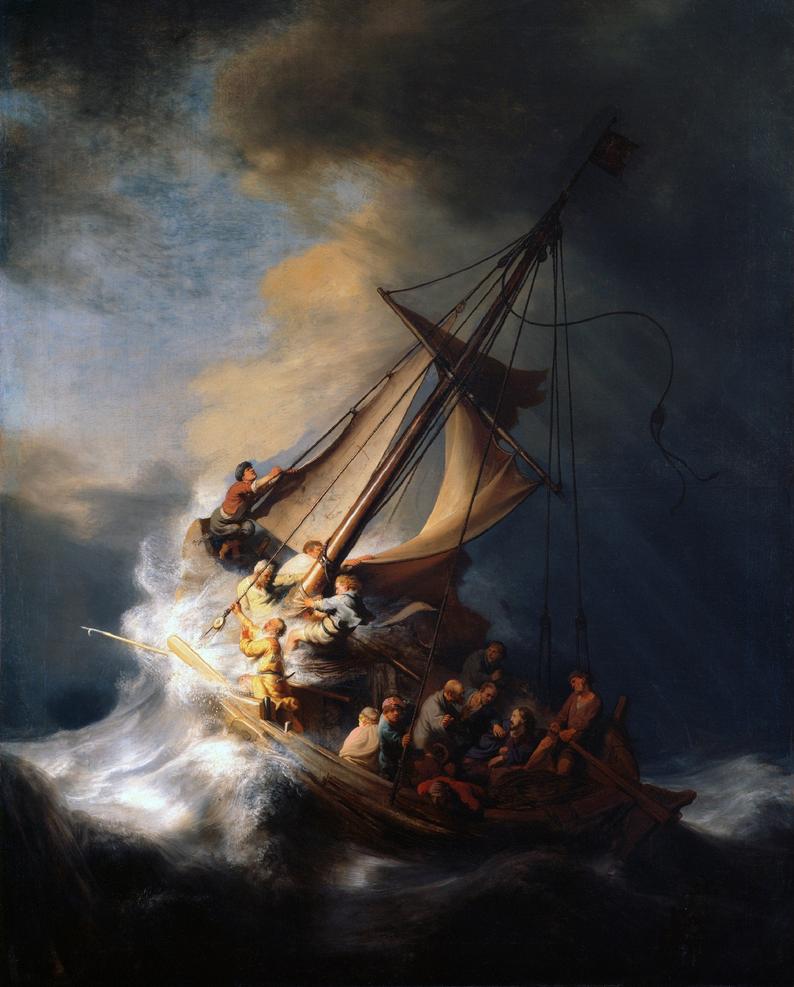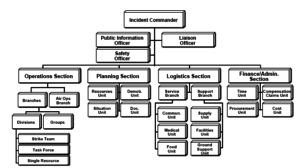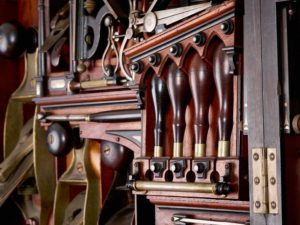 I wrote this article years ago and have held off posting it because as a staff person, I didn’t want a particular pastor or church to see this and to try and “read between the lines.” Most of this are lessons I have learned as serving as a senior pastor and the mistakes I have made as a senior leader. Having served in most typical church positions (excluding music) and as an executive director, these are lessons from various churches, various positions, various regions of the country. That being said, now the article.
I wrote this article years ago and have held off posting it because as a staff person, I didn’t want a particular pastor or church to see this and to try and “read between the lines.” Most of this are lessons I have learned as serving as a senior pastor and the mistakes I have made as a senior leader. Having served in most typical church positions (excluding music) and as an executive director, these are lessons from various churches, various positions, various regions of the country. That being said, now the article.
_______________________________________________
Leading a staff is never easy. There are various personalities that sometimes need a little extra effort to “get along.” Others click very well at the exclusion of the rest of the staff. Throw in a church that is filled with differing expectations, vision conflict, personal drama, life circumstances, and you have a storm off the starboard bow. All of these things are compounded the larger the church and the larger the staff grows.
There is also behind the scenes, a very real enemy who seeks to “steal, kill, and destroy.” It is the Enemy’s goal to stop the gospel from going out, and to keep the church void of any genuine work. At the helm of all these complications is the pastor whose job is to navigate through these treacherous waters. Often times in all the squalls of life we allow ourselves to become too focused on the immediate and lose sight of the big picture. The following is a quick reference guide to what staff need from their pastor. They are simple ideas, but if ignored the pastor will run the ship right into the rocks.
1. Information
Plan to have a regular time where you convey information that you know as pastor that the staff may not be aware of. You sit in on meetings and are briefed on topics the general congregation is not aware of. The staff should never find out information alongside the rest of the church, deacons, or other volunteer leadership. If you cannot trust the staff to use discretion with information then you need to address the issue with the vocal/informative staff person, not shut down all information to the whole staff. There are few things more demoralizing to staff than for them to find out information behind literally the entire church. You don’t like to get blindsided or surprised, so don’t do it to your staff.
Don’t expect them to support something if they are the last to know. They need time to think about the topic and see how they can support it in their given areas. By them receiving this information with everyone else, you are indicating to them that at a minimum you don’t need (or want) their support, and worse case don’t need (or want) any expertise, advice, prayer, etc. they may offer on the topic. It doesn’t slow the process down to drop back and explain things to your staff.
2. Clear Direction
If you have a direction that you would like for the staff to go toward, then take the time to make that very clear (even put it in writing; e-mails, texts, notes, etc.) The best way to do this is to have a designated time when you meet face-to-face (or Zoom) and talk about specific topics.
A very helpful first step is a job description and yearly evaluations. Motivated staff want to know that they are working toward a common goal and direction. They hate having to backtrack to go in another direction. Staff with limited budgets, hate having to constantly change direction because it wastes those limited resources. Don’t waste their time and energy because you want them to go in one direction but have not taken the time to make it clear to them. Don’t assume that they can read your thoughts, or what you assume they should understand from your body language.
3. Genuine Affirmation and Respect
When you affirm them in the public setting show genuine respect. You are not showing someone respect when you constantly call them by the wrong name, or haven’t taken the time to learn their kid’s names. Avoid irrelevant platitudes like “she’s so good with the kids.” Instead, give recent real life examples of how the staff person is doing a good job. If you don’t respect your staff, they won’t respect you. This respect also overflows into meetings, and general office settings. Professional courtesy goes a long way toward guarding against frustrations and anger among staff.
4. Honor Boundaries
Each staff person was hired to cover a specific set of job responsibilities and you should assume that they take that ministry very seriously. While working against developing silos (click here for an article on this topics) senior leadership should recognize and honor how there are boundaries in specific areas within the church. When changes are made in one area of the church, be aware that those changes, more than likely, will affect other areas of the church (click here to read an article on how systems affect each other).
Boundaries can also mean days off, personal time, or even asking them to do things for you personally that are not directly related to their ministry positions. If they were hired as a full time staff person then that means those responsibilities on the job description would take the full amount of time. In other words, don’t keep adding things to their job responsibilities that will affect their time at home, weekday evenings, etc. Yes, there will be times when staff need to help the team do things that were not on the job description, but it should not be a constant expectation.
5. Give Staff What They Need To Do Their Job
Often times this takes the form of a budget. Work to see that they have what they need to lead the ministry that they have been hired to do. It is with in the pastor’s position to guide and direct various committees to go in various directions. Because you have taken the time to talk with your staff and understand the direction they are leading their various departments then you have accurate information to be able to see they get what they need.
If they are constantly requesting more funds, donations, volunteers, etc. and they feel you are doing nothing, then they will feel frustrated. It will feel like the staff person is drowning and you are just standing there watching, making no effort to help.
6. Have Their Back
Staff members should never doubt that the pastor supports them, what they are doing, and gives that support vocally and publicly. Work out differences privately, but when the staff try new things get behind them and push (hard). If you want to have a high rotation of staff, then keep throwing them under the bus or stepping back away from them when things go “sideways.”
If they ask you to use your pulpit to support them, then see how it could be blended into a sermon or some other way to emphasize it. Remember that innovation, change, and steps forward come at the price of trying things that don’t work. If you don’t support them in those times of mistakes, then they will eventually quit trying and do what they know is “safe.” When staff begin to all do what has always been done, the way it has always been done, then there will be the eventual plateau and decline. But before you blame the staff, take a hard look in the mirror.
7. Make the Hard Calls
The pastor (or senior leader) holds the position to lead and make the hard calls. This often involves strong personalities, spiritually immature, and selfish people. Don’t let these sinful people run rough shod over your staff. If a hard decision needs to be made, make it. Don’t ignore it, wait forever to make a decision, or avoid it. Often the staff can’t move forward until you make a decision — just realize that the senior pastor holds his position because hard calls need to be made. If you don’t make these calls it can be detrimental to your staff moving their specific areas forward. Yes, you may make the wrong call, but that’s ok because your staff and leadership will have your back (see#6) because you have supported them, and they know why you are making the call the way you did (see #1). No one expects senior leadership to make the right call 100% of the time, but if you wait too long to make calls then they are wrong 100% of the time.
8. Get to Know Their Ministry
As a pastor, if you have never served as a staff person or in a specific area (children, youth, senior adults, etc.) then take the time to see what the ministry is like and what is involved to carry it out. You should never have to ask “why do you need a budget increase?” or “why are are you not able to add this new responsibility to your weekly work schedule?” You should know (see #2 & 5). The church has chosen to hire a specific staff person to do a specific job.
This usually involves a designated (or expected/required) amount of hours and responsibilities. Help to guard their plate by not allowing others (or yourself) to continuously add responsibilities to staff. All positions have busy (i.e. stressful) times of the year (for the Children’s Pastor it may be Vacation Bible School i.e.). If you know this, then it would be very helpful to the staff for you to stand guard for them as they do their job, or (heaven forbid) even help in these areas during these stressful and very busy times.
Andy Stanley has what he calls “the gap.” This is where a staff member does something that appears to break the rules or cultural expectations of the organization. Stanley gives the example of arriving to a staff meeting late. When this happens, and with no explanation given, people naturally fill “the gap” with why they are late. If they are given the benefit of the doubt then the person who observes the late staff person will say to themselves, “his car must have broken down,” or “someone must have stopped him for a ministry related issue,” etc.
What ever they place in this gap, it should assume the best of the person. Staff members need to know that their direct supervisor has faith in them and is not always assuming the worst. If their “boss” is always assuming the worst every time something appears negative, then it can be very frustrating and demoralizing. It will wear on them after a while — they will always feel like they have to explain everything. Always assume the best and good quality people will rise to the expectation. Always assume the worst and people will rebel and harbor ill will. [1] This is really a matter of trust. Does the senior pastor trust the staff? If so, trust them to do their jobs and assume they are doing their job to the best of their abilities.
10. Grow Your Staff
Staff need to know that you love them and want what’s best for them (and their families). When you meet with and talk about their ministries, if they begin to pick up that you see them as disposable tools and that they are there to make you look good, then they will not be supportive of your leadership. One of the best ways to convey this attitude is for you to constantly focus on their ministry numbers, performance, events, etc. and not really care about their future (or their family’s future). Staff are not there to make your name known, they are in ministry to make Christ’s name known. If you will invest in them and help them grow, then the kingdom of God is better served for it, and they will respect you.
So there you have it, 10 things staff need from their pastor or senior leader. Let me know what you think in the comment section below. Thanks for taking time to read the article!
________________
[1] This is assuming that the staff person is not constantly late for reasons of irresponsibility. If a staff person earns the reputation for having negative reasons for the gaps that is another issue entirely. It is really hard to assume the best in a staff person if they are always having “gaps.” If they know they are going to be late, for example, then they should call. This does not make being late “ok,” but it does show the leader that they are aware of the gap and are trying their best to rebuild the trust.


 This system for the SBC Disaster Relief is premised on the different color hat system. At the basic and lowest level is the yellow hat. This is a person who has gone through orientation of how the overall system works, but may not have had training in specific areas (serving food, childcare, or debris removal). At the next level is the blue hat – this person is responsible for a team of yellow hats and has had training in one or all of the services offered.
This system for the SBC Disaster Relief is premised on the different color hat system. At the basic and lowest level is the yellow hat. This is a person who has gone through orientation of how the overall system works, but may not have had training in specific areas (serving food, childcare, or debris removal). At the next level is the blue hat – this person is responsible for a team of yellow hats and has had training in one or all of the services offered. With unity of command everyone only reports to one person. If I am clearing debris then I go to one blue hat to tell me what to do. If I have an issue, question, etc. then I can go to one person.
With unity of command everyone only reports to one person. If I am clearing debris then I go to one blue hat to tell me what to do. If I have an issue, question, etc. then I can go to one person. (3) If you are going to go into the world of chaos and change it then you need a plan. People need to know the plan (preferably before disaster hits), and it has to be simple (three colors, three hats). Imagine if there were 15 colors, shades of blue everywhere, name tags, hats, jackets, vests, all with different meanings. I can’t remember what I had for lunch much less a bunch of colors meaning different things. What we do has to be simple, memorable, and simple – did I say simple? I forgot. The more chaotic of a situation we run into, the simpler the instructions have to be.
(3) If you are going to go into the world of chaos and change it then you need a plan. People need to know the plan (preferably before disaster hits), and it has to be simple (three colors, three hats). Imagine if there were 15 colors, shades of blue everywhere, name tags, hats, jackets, vests, all with different meanings. I can’t remember what I had for lunch much less a bunch of colors meaning different things. What we do has to be simple, memorable, and simple – did I say simple? I forgot. The more chaotic of a situation we run into, the simpler the instructions have to be. (5) The goal is clear. For disaster relief the objective is clear even before you show up. There has been a natural disaster and there are people who need help. We are Christians and have been commanded to serve and help people and then share with them the hope of the gospel (in that order). In our organizations we must make the goal clear so that others may join us. Along those same lines, the way they join in (systems) must be clear as well. If they want to be apart of what you are doing do they know how to join in?
(5) The goal is clear. For disaster relief the objective is clear even before you show up. There has been a natural disaster and there are people who need help. We are Christians and have been commanded to serve and help people and then share with them the hope of the gospel (in that order). In our organizations we must make the goal clear so that others may join us. Along those same lines, the way they join in (systems) must be clear as well. If they want to be apart of what you are doing do they know how to join in? About 350 years ago a shipload of travelers landed on the northeast coast of America. The first year they established a town site. The next year they elected a town government. The third year the town government planned to build a road five miles westward into the wilderness. In the fourth year the people tried to impeach their town government because they thought it was a waste of public funds to build a road five miles westward into a wilderness. Who needed to go there anyway?
About 350 years ago a shipload of travelers landed on the northeast coast of America. The first year they established a town site. The next year they elected a town government. The third year the town government planned to build a road five miles westward into the wilderness. In the fourth year the people tried to impeach their town government because they thought it was a waste of public funds to build a road five miles westward into a wilderness. Who needed to go there anyway?
 “Selective obedience” is disobedience. When we choose what to obey, we are effectively telling God that we are His masters and have the right to decide for ourselves. Such people do not understand the meaning of obedience.
“Selective obedience” is disobedience. When we choose what to obey, we are effectively telling God that we are His masters and have the right to decide for ourselves. Such people do not understand the meaning of obedience. I first came across the idea that we will discuss today when Dave Canterbury in his New York Times Bestseller, Bushcraft 101 said, “Wise hikers carry few essentials and tools with them on their journeys; instead of extra equipment, they carry the knowledge and skills needed to create necessary items straight from the landscape.”
I first came across the idea that we will discuss today when Dave Canterbury in his New York Times Bestseller, Bushcraft 101 said, “Wise hikers carry few essentials and tools with them on their journeys; instead of extra equipment, they carry the knowledge and skills needed to create necessary items straight from the landscape.” Christopher Schwarz in his book The Anarachist’s Tool Chest discusses his journey as the General Editor of Popular Woodworkers Magazine in discovering how craftsmen of old, generally didn’t have a large amount of tools; not because they couldn’t afford them or some other reason. He says, “ . . . artisans didn’t require as many tools because the basic skill level was higher . . . tool inventories and other published accounts indicate that the pre-Industrial wood-worker could use fewer tools to make furniture that was equal to or better than what we make today.”
Christopher Schwarz in his book The Anarachist’s Tool Chest discusses his journey as the General Editor of Popular Woodworkers Magazine in discovering how craftsmen of old, generally didn’t have a large amount of tools; not because they couldn’t afford them or some other reason. He says, “ . . . artisans didn’t require as many tools because the basic skill level was higher . . . tool inventories and other published accounts indicate that the pre-Industrial wood-worker could use fewer tools to make furniture that was equal to or better than what we make today.” survivability. Both men can do what they want (either building a nightstand, or making glue in the forest) with the knowledge of a craftsman and some basic tools.
survivability. Both men can do what they want (either building a nightstand, or making glue in the forest) with the knowledge of a craftsman and some basic tools.